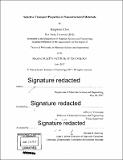Selective transport properties in nanostructured materials
Author(s)
Choi, Jongwon, Ph. D. Massachusetts Institute of Technology
DownloadFull printable version (14.07Mb)
Other Contributors
Massachusetts Institute of Technology. Department of Materials Science and Engineering.
Advisor
Jeffrey C. Grossman.
Terms of use
Metadata
Show full item recordAbstract
Nanostructuring is an established method in engineering materials due to exciting new properties that manifest only in the nano-regime. When investigating nanomaterials, atom-scale simulations can be powerful tools. Through computational approach, one can 1) understand the underlying physics of a materials property, 2) propose new design principles for certain applications and 3) evaluate the performance of the material. In this thesis, we explore new materials and engineering approaches for various fields of application through a number of computational methods - molecular dynamics, density functional theory, semi-classical Boltzmann theory and Monte Carlo simulations. We first investigate the thermal and electrical transport properties of rippled graphene structures. Here we focus on the rippled textures formed by topological defects of graphene, namely Stone-Wales defects and graphene nanobuds. By exploring different configuration of Stone-Wales defects, the effect of rippling on the thermal conductivity is isolated. We also calculated the thermal and electrical transport properties of rippled graphene nanobuds and evaluate their thermoelectric efficiency. While looking into practical approaches to achieve two-dimensional materials with periodic nanostructures, our interest has extended to covalent organic frameworks (COFs) and their desalination properties. Through classical calculations, we show that COF membranes can achieve high salt rejection rate while enhancing the water permeability up to two to three orders of magnitude compared to conventional desalination membranes. The COF membrane was also shown to have decent mechanical properties although further modification may be needed to ensure its mechanical integrity in practical settings. Another type of self-assembled frameworks is the metal-organic frameworks (MOFs). Here the gas adsorption properties of MOF in defective and strained structures have been explored. We first look into water adsorption properties of MOF-801 and explore the role of defects. The defect sites contribute to preferential adsorptive behavior, which changes the water adsorption isotherm significantly. In addition, we look into strained UiO-66 structures and reveal that compressed, asymmetrical pores can affect the adsorptive behaviors of methane and carbon dioxide. This dissertation consists of five chapters. Chapter 1 first covers the general overview of the fields of application in concern: thermal and electrical properties of graphene-based systems, desalination, gas adsorption. Chapter 2 focuses on theoretical methods used for calculating thermal transport properties, electrical properties, desalination properties, and adsorption properties of materials of interest. Our results for the thermal and electrical transport properties of rippled graphene structure are presented in Chapter 3. In Chapter 4, we switch gears to calculate the desalination properties of two-dimensional covalent organic frameworks. Lastly, the gas adsorption of metal organic frameworks is discussed in Chapter 5.
Description
Thesis: Ph. D., Massachusetts Institute of Technology, Department of Materials Science and Engineering, 2017. Cataloged from PDF version of thesis. Includes bibliographical references.
Date issued
2017Department
Massachusetts Institute of Technology. Department of Materials Science and EngineeringPublisher
Massachusetts Institute of Technology
Keywords
Materials Science and Engineering.